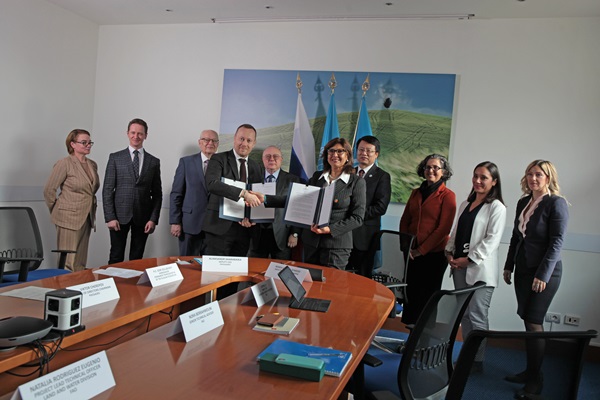
Rome - The Food and Agriculture Organization of the United Nations (FAO) welcomed an additional $3 million contribution from PhosAgro, Russia's leading phosphate-based fertilizer producer, to support the efforts of the Global Soil Partnership (GSP) to help more farmers implement soil-improving management measures and boost the capacities of national soil laboratories in Africa, Asia, Eastern Europe, Latin America, and the Near East.
With this top-up, FAO plans to distribute additional 1 200 Soil Doctors Testing Kits - special kits for assessing soil condition - to certified Soil Doctors and trainers. Around 5 000 farmers will then be trained and supported to adopt sustainable soil management practices by 2026.
The three-year project also envisages promoting reliable and accurate soil and fertilizer testing through the Global Soil Laboratory Network (GLOSOLAN) and the consolidation of the International Network on Soil Fertility and Fertilizers (INSOILFER), promoting efficient and environmentally-friendly practices consistent with the International Code of Conduct for the Sustainable Use of Management of Fertilizers. Another major activity under the project is the application of ecosystem-based solutions to remediate on-farm soil pollution through the International Network on Soil Pollution (INSOP).
For the first time, PhosAgro funding will also support the implementation of measures on recarbonization of agricultural soils (RECSOIL). This initiative will allow farmers to boost productivity, enhance resilience and reduce greenhouse gas emissions.
The contribution agreement was recently signed by Maria Helena Semedo, FAO Deputy Director-General, and Alexander Sharabaika, Deputy Chairman of the Board of Directors of PhosAgro.
“PhosAgro is a long-standing partner in sustainable soil management with clear and concrete results and an example of effective collaboration with the private sector. Today’s agreement is a significant step forward to strengthen the actions of the Global Soil Partnership,” Semedo said.
“FAO looks forward to further working together to achieve the ambitious goals of the Global Soil Partnership: healthy soils worldwide, in line with the FAO Strategic Framework 2022-31 and the 2030 Agenda for Sustainable Development. Through our collective efforts, we can make these goals a reality,” she added.
Russia’s Permanent Representative to FAO, Igor Golubovskiy, said: “Fertilizers are an important component of sustainable food supply chains. The Russian Federation has always been a reliable partner of the FAO and a responsible participant in international markets, steadily supplying fertilizers to countries in need. PhosAgro is the undisputed leader among Russian [fertilizer] companies. For many years, it has been developing technologies and know-how focused on sustainable land use and farming. It helps farmers involved in intensive agriculture to increase their productivity while preventing the accumulation of pollutants in the soil. As part of the new agreement with the FAO, PhosAgro will help protect soils from degradation and increase productivity, thus making an important contribution to the fight against hunger around the world.”
Viktor Cherepov, Chairman of PhosAgro’s Board of Directors, said: “It is a great honour for PhosAgro to be a partner in such an important project, and I would like to express my special gratitude to our colleagues from the FAO for the role they have played in the development of our long-term partnership. In 2018, PhosAgro became the first Russian company chosen to be a part of a global soil protection initiative. For us, this is a great honour and a great responsibility. By supplying high-performance, environmentally friendly fertilizers that are free of dangerous concentrations of toxic substances to 100 countries on every inhabited continent, we are helping ensure the food security of the planet. By extending our agreement, we are expanding and deepening our partnership with the FAO. We will make every effort to ensure that our partnership serves as an international benchmark for best practices when it comes to soil protection, and that farmers can enjoy bountiful harvests of crops that are safe for human beings while also maintaining the fertility of their fields.”
With this new tranche, PhosAgro has invested a total of $5.4 million in improving sustainable soil management worldwide since the beginning of collaboration with FAO in 2018. PhosAgro’s previous contributions enabled FAO to reach 11 500 farmers through the Global Soil Doctors Programme, and implement GLOSOLAN benefitting over 1 000 laboratories from 160 countries.
Over 4 000 experts from soil laboratories have been trained in implementing standard operating procedures. And over 300 soil laboratories from 110 countries have enhanced their capacities for quality assurance and quality control with a view to focus on assessing fertilizers' quality and safety.
PhosAgro is the largest phosphate-based fertilizer producer in Europe, the largest producer of high-grade phosphate rock, one of the leading producers of feed phosphates in Europe, and Russia's only producer of nepheline concentrate.